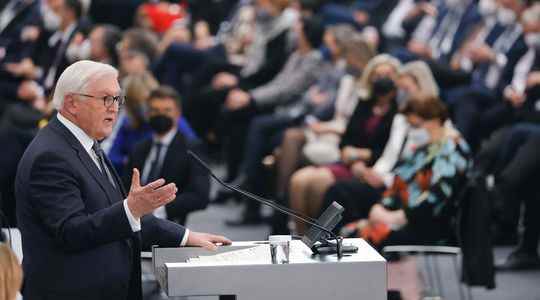Berlin changes tone. After adopting a rather conciliatory and cautious stance vis-à-vis Russia on the tense situation on Ukraine’s borders, Germany is increasingly siding with its Western allies. Thus, President Frank-Walter Steinmeier clearly pointed out Sunday the “responsibility” of Moscow in the risk of “war” in Europe, trying to clarify the position of his country. “I appeal to (Russian) President Vladimir Putin: release the noose from Ukraine’s neck! And seek with us a way to preserve peace in Europe!” exclaimed the German head of state.
He made these remarks on the day of his re-election for a five-year term, and on the eve of a long-awaited trip to Kyiv and then Moscow by German Chancellor Olaf Scholz, who warned him that Western sanctions would be “immediate” in case of a Russian invasion of Ukraine, describing the situation as “still very very serious”. The position of president in Germany is mostly ceremonial, but the words of its holder, a respected national moral authority, carry in the country and beyond.
A new German firmness
“We are in the midst of a risk of military conflict, of war in Eastern Europe, and it is Russia that bears the responsibility,” said Frank-Walter Steinmeier. Speaking of a growing “removal” of Russia from Europe, the one who was head of German diplomacy for several years called for firmness.
“As we can see, peace is not self-evident, we must always work to preserve it, in dialogue, but when necessary by saying things clearly, by showing deterrence and determination”, said he launched, to applause.
In the wake of the Head of State, Olaf Scholz also showed firmness before going to Kiev on Monday, then to Moscow on Tuesday. “In the event of military aggression against Ukraine, which would endanger its sovereignty and territorial integrity, this would lead to tough sanctions, which we have carefully prepared and which we can implement immediately with our allies in Europe and within NATO,” Olaf Scholz told the press following the election of the head of state.
He worried about a “very serious threat to peace” in Europe. In a sign of growing concern in Berlin, a German government source acknowledged that “our concern has grown” about an invasion. “We think the situation is critical, very dangerous,” said this source on condition of anonymity, referring to warnings from Washington. “Many elements point, in a very worrying way, in the direction” of the validity of the current fears, she added.
A cautious position criticized in Europe
A way for the German government to respond to criticism, numerous in recent weeks, on Berlin’s position with regard to Moscow. Germany has been criticized for a wavering attitude and its lack of support, military in particular, with regard to Kiev.
“It is time for Germany to remove its Russian glasses in the conduct of its policy towards Ukraine because they blur its vision”, for example accused the Ukrainian ambassador in Berlin, Andrij Melnyk, in an interview on Sunday with German public radio.
Despite everything, Germany continues to refuse to deliver “lethal” weapons to Ukraine, sheltering behind a policy in force since the post-war period in the country and prohibiting such sales in conflict zones.
On the other hand, Berlin is ready to examine Ukrainian requests concerning in particular night vision devices. And Germany could announce in Kiev an increase in its bilateral economic aid to Ukraine. It has already paid him 2 billion euros since the annexation of Crimea in 2014. Kiev is calling for measures of “several billion euros”.
Various factors
So far, Germany has indeed adopted a diplomatic rather than a deterrent strategy. German Navy chief Kay-Achim Schönbach said at the end of January that the idea that Russia could invade Ukraine was “nonsense” – he had to resign the next day.
“As the continent’s leading power, Germany should guide the European response to the current crisis by detailing the sanctions against Russia in the event of an attack, believes Stefan Meister, of the think tank German Council for Foreign Relations (DGAP)n interviewed by L’Express last month. Olaf Scholz’s lack of leadership irritates Washington as much as it weakens the Western approach, which plays into the hands of the Kremlin.”
Berlin’s reluctance can be explained by several factors: like German society, the Social Democratic Party (SPD) is divided on the approach to take with Vladimir Putin. Furthermore, the German state is economically dependent on Russian gas, which accounts for 51% of natural gas imports.
In addition, “the Germans believe that going too far on arms deliveries or going into the details of sanctions could have a counterproductive effect and fuel Russian paranoia”, explains for L’Express Marie Dumoulin, director of the Europe program extended to the European Council on International Relations.
Finally, the guilt linked to the Second World War also explains Germany’s sometimes conciliatory tone towards Moscow. The Nazi regime was responsible for 25 million Soviet deaths, historians estimate. “The Russians, without any complex, have always tried to play on German bad conscience”, noted in January for L’Express Jean-Maurice Ripert, French ambassador to Russia from 2013 to 2017.
